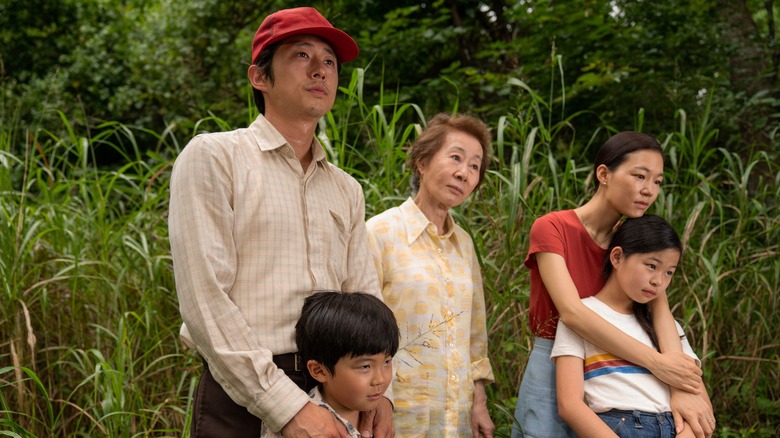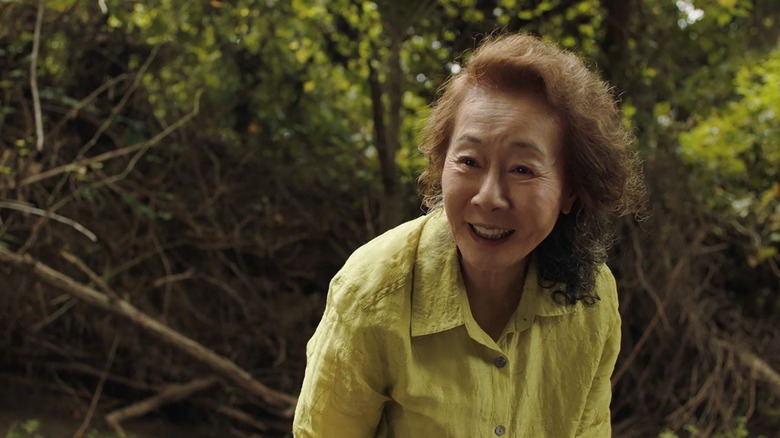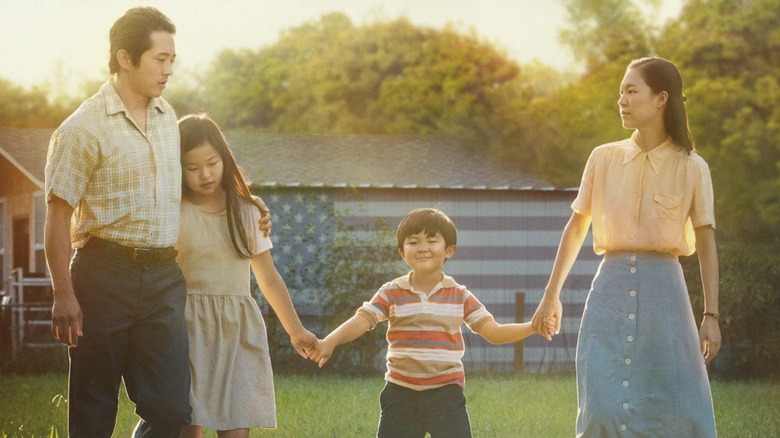
There is an old joke that goes like this:
Q: What is the definition of a farmer?
A: A man outstanding in his field.
The brilliance of Lee Isaac Chung's semi-autobiographical "Minari" is that he makes sure, in his calm and keenly observant way, that we really care about why the farmer in question is out in his field, standing. He also does a lot of smoking, striving, and dreaming, because that field is his entire life, and it's make or break for him and his family.
Played with quiet fervor by the excellent Steven Yeun, Jacob is a Korean immigrant who has spent 10 years scraping together a living by sexing chickens before gambling everything on a few acres of land in Arkansas. His plan is to grow crops and sell them to Korean grocers in the big city. Jacob is taking a huge chance to give his family something that is truly theirs, and he's prepared to risk his marriage to make it work.
Along for the ride are his doubting wife Monica (Han Ye-ri), daughter Anne (Noel Kate Cho), and cute son with a heart condition David (Alan Kim). The only abode on the plot is an old trailer without running water. Monica is unhappy, and we can see the strain in their marriage. She wants to leave, but as a compromise, the family invites her aging mother Soon-ja (Youn Yuh-jung) to stay with them. Young David doesn't like the coarse old woman at first, but soon a strong relationship develops between them.
Inspired by directors like Terence Malick and Wong Kar-wai, Chung focuses on his characters from a dreamy, detached viewpoint, while the strength of the performances keep us fully invested. These characters feel like real people, and we instinctively root for them because they seem like such decent folk.
How Much Of Minari Is Based On A True Story?

Chung made his feature directorial debut with "Munyurangbo," a powerful drama set in the aftermath of the Rwandan genocide and the first narrative feature in Kinyarwanda, the country's dialect. After a few more films, he told ScreenDaily he considered retiring from directing to take a teaching job before deciding to give it one last shot with "Minari."
The movie is loosely based on Chung's experiences growing up on a farm in Arkansas. In that same ScreenDaily interview, he explained that the script started out as a story he wanted to tell to his daughter about his own childhood, now that he'd reached an age when he could better understand his own father's perspective and motives for moving the family across the country to start anew.
He was also influenced by Willa Cather, the author who wrote about New York high society before returning to her roots and writing about her upbringing in Nebraska, earning acclaim as a chronicler of the pioneer experience. As Chung said in an interview with NPR:
"And the resulting books ended up being so personal and so beautiful about her own experiences growing up in Nebraska that she said later in life that her life really began when she stopped admiring. So she stopped admiring all these authors and trying to emulate them. And instead, she started to remember."
Inspired by Cather, he sat in his local library and wrote down around 80 memories from his childhood. He soon realized that these memories formed a narrative of a Korean family setting out and settling down in the middle of nowhere.
Lastly, there was the minari, the Korean plant that his grandmother planted which thrived on his father's farm. Although this came directly from his memory of his elder, the plant served as a useful metaphor for the whole story.
Minari Ending Explained

Jacob and Monica's marriage is in danger of falling apart, and several misfortunes threaten to hasten its demise. He avoids spending money on a water diviner to locate a good spot for a well, using his own ingenuity to find water instead. But when his well runs dry and endangers his crops, the family must resort to using water from a nearby creek. It is here where Soon-ja plants the minari, brought from Korea along with some other goodies.
Jacob and his helper Paul (Will Patton) manage to store enough of their harvest to fulfill his first order, but in a heartbreaking scene late in the movie, Soon-ja accidentally burns down the barn. Jacob and Monica risk their lives trying to save the supplies from the blaze while Soon-ja, dazed and distraught, wanders off into the night. David and Anne run after her and bring her home.
The barn disaster serves to bring Jacob and Monica back together, and later they pay the water diviner to find a good location for a well. Jacob and his son then go to the creek where they admire the minari that Soon-ja planted, now flourishing in its new home. As Chung said in an interview with Filmmaker Magazine:
"Minari, as it started, was symbolizing a lot of what I felt about my grandmother, what I learned from her and the feeling I had about her. Later, you know, I started to see a lot of those connections—to immigration itself, and to the stories of the people who came over and planted themselves in the worst soils and started to thrive and grow."
The metaphor is time-worn, but feels sincere here. The family is now unified and, like the minari, ready to set down roots and thrive on this previously unpromising patch of American soil.
Why Does The Ending Pay Off So Well?

At first glance, "Minari" is a simple character-driven story, but ultimately it's a film that wonderfully captures a version of the immigrant experience and the American Dream. It is also a family drama that is universal, despite the Korean specifics. As an immigrant myself setting up home in the Czech Republic, I really got onboard with Jacob and Monica's struggle to do the best for their young family. I also recognized the importance of the minari's symbolic connection with the homeland: When we bought our home in the South Moravian countryside, we decided to paint our house Suffolk Pink, a very specific shade native to our home county in England.
Audiences and critics connected warmly with the film. It made a good return on its tiny $2 million budget (via BoxOfficeMojo) and earned a Best Picture nomination at the Academy Awards, along with five other nominations. Steven Yeun became the first Asian American to receive a Best Actor nod and Youn Yuh-jung became the first Korean to win an acting Oscar, taking home Best Supporting Actress for her role as the granny who gets addicted to wrestling and swears a lot before sadly suffering a stroke.
The love from critics and awards bodies was soured slightly by the Golden Globes deeming "Minari" only eligible for Best Foreign Language Film instead of the main prize because more than 50% of its dialogue wasn't in English. It won the award, but it must have felt like hollow victory. Sure, the Golden Globes have their own set of rules, but it is completely erroneous to consider "Minari" a foreign film just because its characters speak Korean as a first language; it is, after all, an essential American story.
Read this next: 14 Sequels That Truly Didn't Need To Happen
The post Minari Ending Explained: A Fire Can't Torch the American Dream appeared first on /Film.
0 Comments